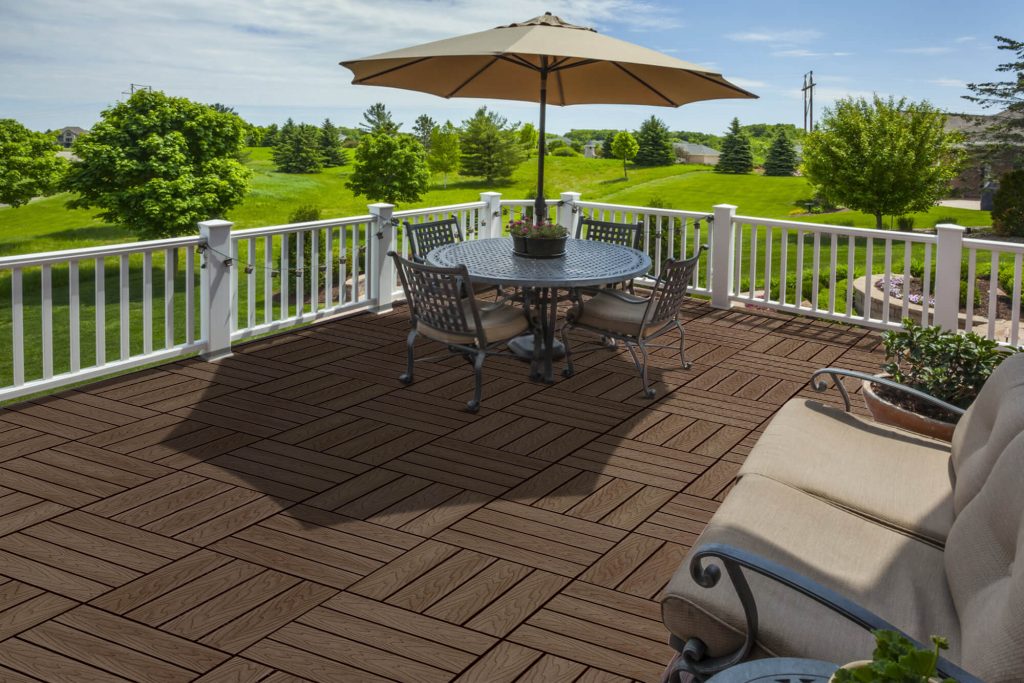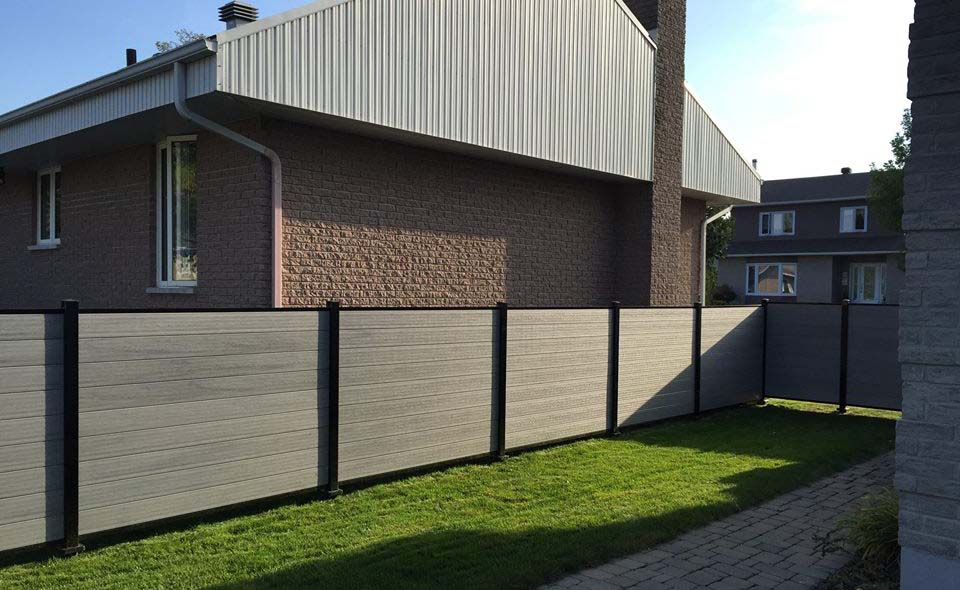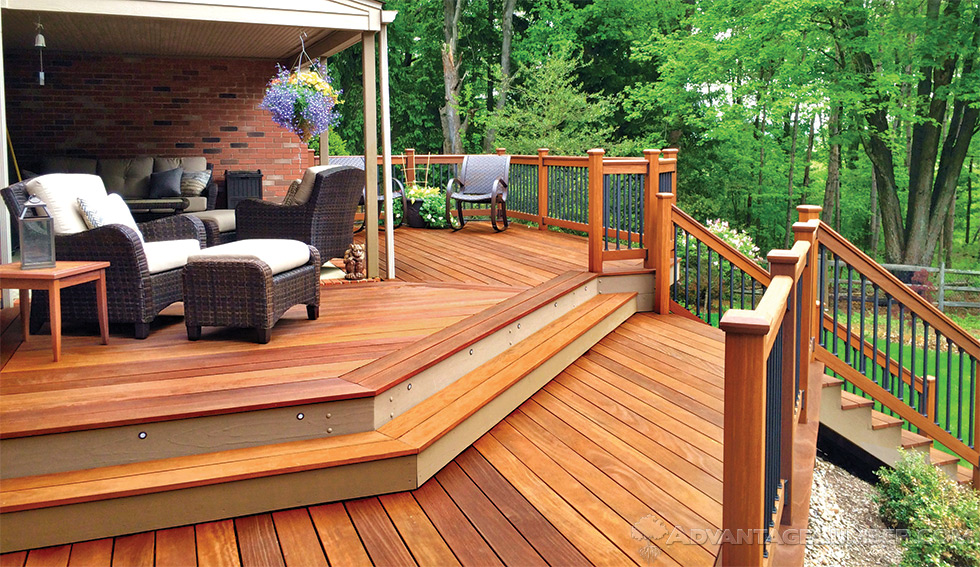If you want to upgrading your garden, patio, balcony, or any other external surface, outdoor interlocking tiles UK homeowners trust offer one of the most convenient and stylish solutions. These tiles are becoming increasingly popular for both residential and commercial applications due to their ease of installation, durability, and versatile design choices.
Table of Contents
In this comprehensive guide, we will cover everything you need to know about outdoor interlocking tiles in the UK: what they are, their types, benefits, applications, installation process, maintenance, cost, and where to buy them. Whether you’re renovating a terrace or building a commercial outdoor area, this article will help you make an informed decision.
What Are Outdoor Interlocking Tiles?
Outdoor interlocking tiles are modular flooring units designed to connect with one another using an interlocking mechanism—typically a peg-and-loop or snap-together system. They do not require adhesive, nails, or screws, making them incredibly easy to install. Their raised-base structure allows for drainage, preventing water accumulation and ensuring the surface stays dry and safe.
In the UK climate, where wet weather is common, these interlocking tiles provide a practical flooring solution for outdoor areas that experience rainfall, frost, or fluctuating temperatures.
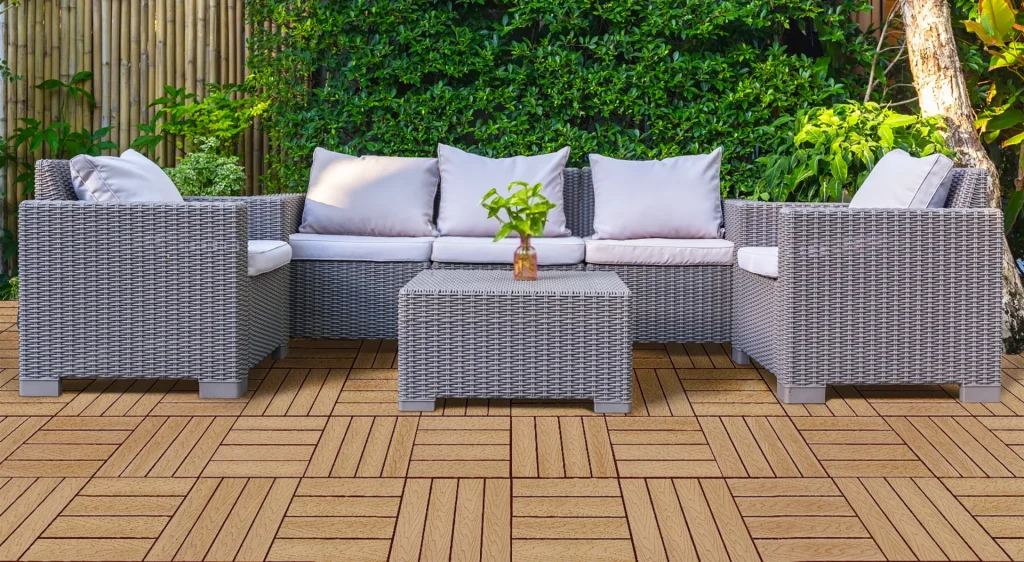
Why Choose Outdoor Interlocking Tiles in the UK?
The outdoor interlocking tiles UK market has grown rapidly because of the following reasons:
1. Weather Resistance
British weather is known for its unpredictability. These tiles are often made from materials like polypropylene, rubber, WPC (Wood Plastic Composite), or porcelain, which can withstand harsh elements such as rain, snow, UV rays, and frost.
2. DIY-Friendly Installation
No special tools or skills are needed to lay interlocking tiles. Many UK homeowners are turning to these products for weekend DIY projects. You simply lay them down on a flat surface and click them together.
3. Stylish Designs
Available in woodgrain, stone, slate, and modern textured finishes, these tiles can transform a dull patio into a sophisticated space. Whether your aesthetic leans toward rustic, modern, or contemporary, there’s a design to match.
4. Low Maintenance
Unlike natural wood decking that requires oiling or sealing, interlocking tiles are mostly maintenance-free. Occasional hosing down or light scrubbing is sufficient to keep them looking fresh.
5. Temporary or Permanent
Need a temporary floor for an event or outdoor dining space? These tiles can be installed and later removed without damaging the surface underneath.
Types of Outdoor Interlocking Tiles UK Homeowners Can Buy
1. Plastic Interlocking Tiles
Made from high-impact polypropylene or PVC, these tiles are ideal for patios, garages, or balcony flooring. They are lightweight, durable, and water-resistant.
2. Rubber Interlocking Tiles
Best for play areas, gyms, or spaces requiring extra cushioning. Rubber tiles are slip-resistant and provide shock absorption.
3. WPC Interlocking Deck Tiles
WPC (Wood Plastic Composite) combines natural wood fibers with plastic. It mimics the look of timber but without the maintenance headaches. These are perfect for garden decking and pool surrounds.
4. Porcelain or Stone-Look Interlocking Tiles
Though heavier, some manufacturers offer porcelain tiles with an interlocking base for a high-end finish. These work well in garden paths, rooftops, and patios.
5. Artificial Grass Interlocking Tiles
A fantastic solution for instant greenery. These are commonly used in small gardens or balconies where natural grass isn’t feasible.
Where Can You Use Outdoor Interlocking Tiles in the UK?
The flexibility of these tiles allows them to be used in many settings:
Backyards and gardens
Terraces and rooftops
Balconies
Patios and courtyards
Around hot tubs and pools
Campsites and caravan grounds
Outdoor cafes or pubs
Temporary exhibitions or events
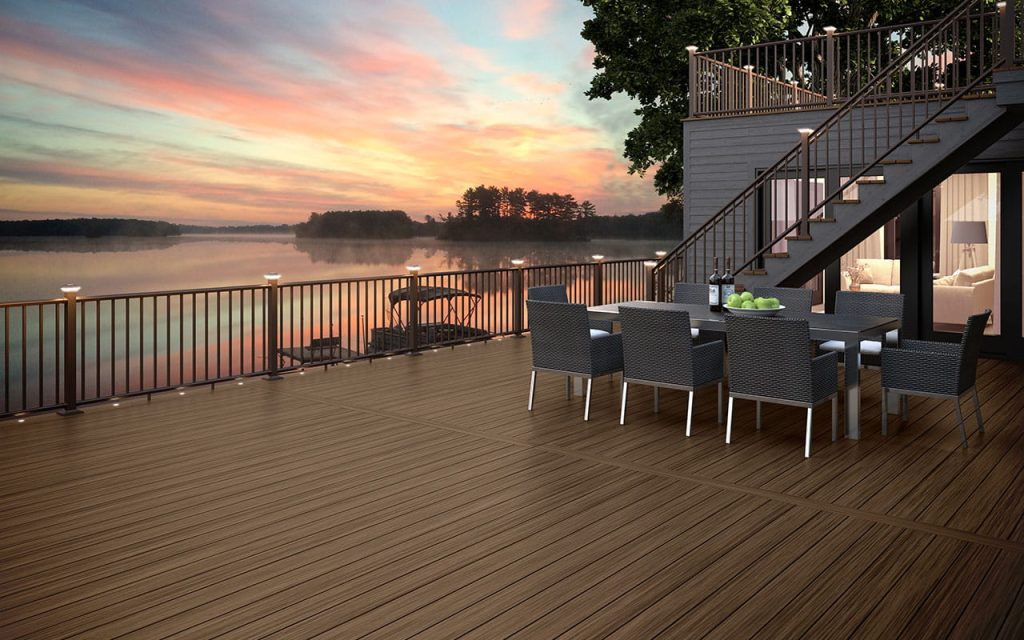
Step-by-Step Installation Guide
Installing outdoor interlocking tiles UK style is straightforward. Here’s how to do it:
Step 1: Clean the Surface
Ensure the area is flat, dry, and free from dirt, grass, or loose stones.
Step 2: Plan Your Layout
Measure the space and plan your layout to minimize tile cutting and waste.
Step 3: Start at a Corner
Begin installing from one corner of the space, aligning the tiles so the loops face outwards.
Step 4: Interlock Tiles
Click each tile into the next one. Use a rubber mallet if needed to ensure tight joins.
Step 5: Cut Edge Tiles
If your layout reaches edges or obstacles, use a jigsaw or handsaw to cut tiles to fit.
Step 6: Install Edge Trims
Many manufacturers provide edge trims for a clean finish.
Maintenance Tips
Regular Cleaning: Sweep or vacuum leaves and debris. Hose down to clean accumulated dirt.
Avoid Harsh Chemicals: Use mild detergent for scrubbing. Avoid bleach unless recommended by the manufacturer.
Check for Shifts: In high-traffic areas, check periodically to ensure tiles remain locked in place.
Winter Care: Most tiles can stay outside year-round, but you can store them in extreme cold if preferred.
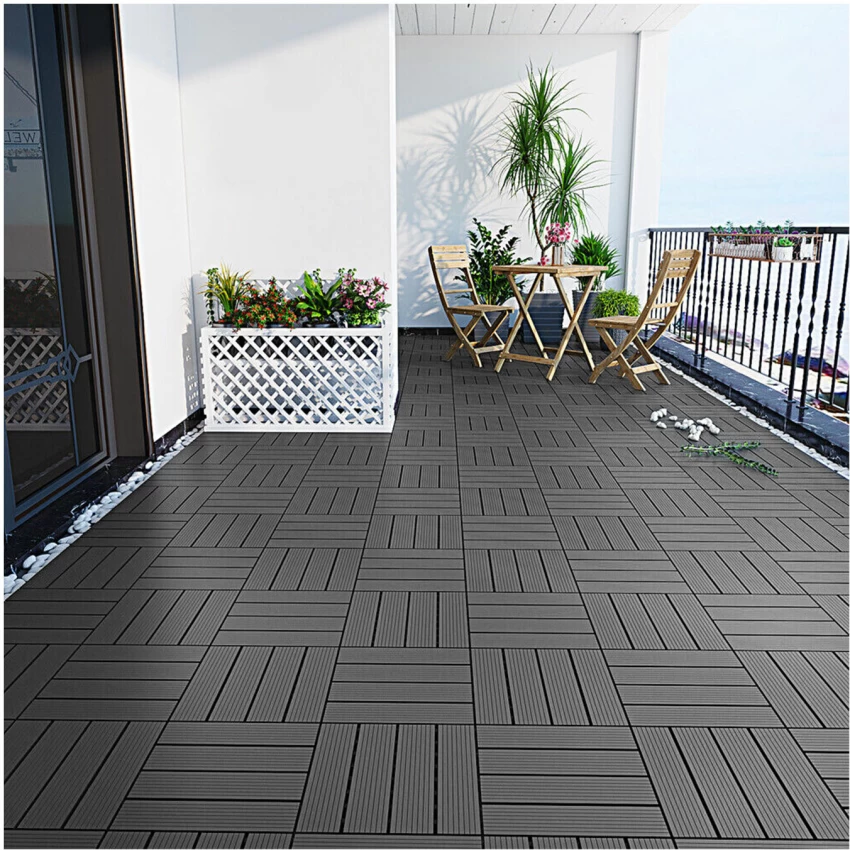
Cost of Outdoor Interlocking Tiles in the UK
Prices vary depending on material, brand, and style. Here’s a general breakdown:
| Type | Average Price (per m²) | Notes |
|---|---|---|
| Plastic Interlocking Tiles | £15 – £25 | Ideal for balconies, patios |
| Rubber Interlocking Tiles | £25 – £40 | Great for children’s play areas |
| WPC Deck Tiles | £30 – £50 | Best for stylish garden decks |
| Porcelain Interlocking Tiles | £50 – £80 | High-end, durable, elegant |
| Artificial Grass Tiles | £25 – £45 | Adds greenery without the maintenance |
Remember, buying in bulk or from trade suppliers can reduce the cost significantly.
Eco-Friendly Options
If sustainability is important to you, look for:
Recycled Materials: Many plastic interlocking tiles are made from recycled polypropylene.
WPC Decking Tiles: These use recycled wood fibers and plastics.
Manufacturers with Green Certifications: Like FSC-certified wood or ISO14001 environmental systems.
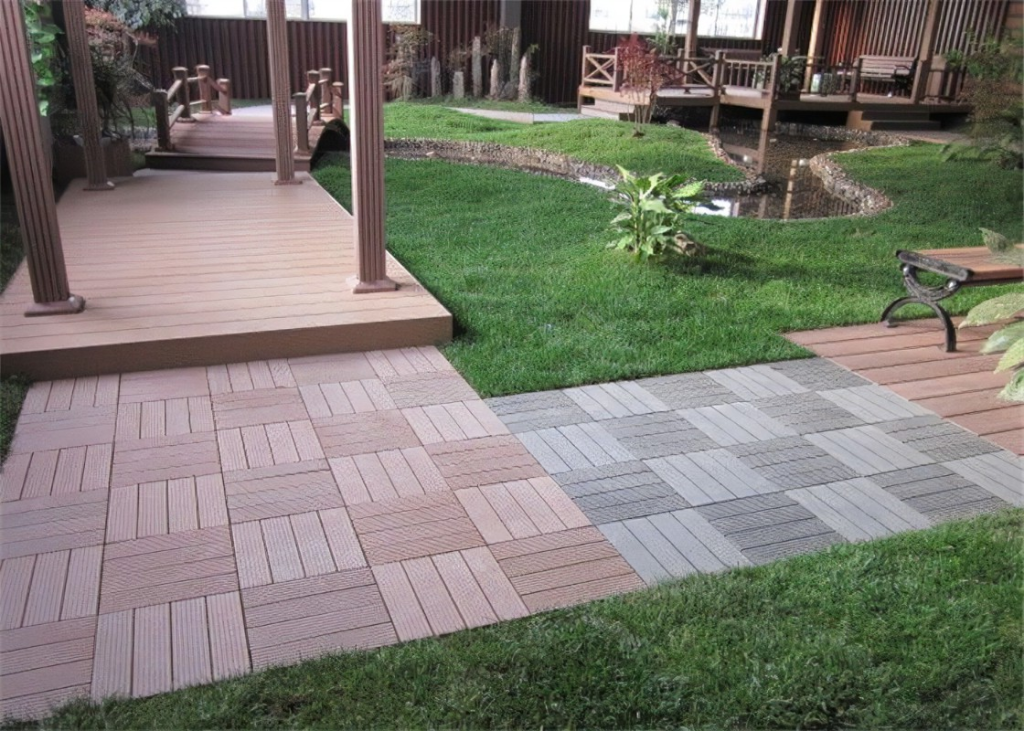
Pros and Cons of Outdoor Interlocking Tiles UK
Pros and Cons of Outdoor Interlocking Tiles UK
Pros:
Easy to install and remove
No need for adhesives
Wide variety of styles
Excellent water drainage
Suitable for all UK climates
Non-slip surfaces available
Cons:
May not be suitable for uneven terrain without leveling
Some cheap plastic types may fade over time
Heavier types like porcelain require careful installation
Customer Reviews and Real Experiences
Here’s what UK customers are saying:
“We installed WPC interlocking deck tiles in our garden. It took just one afternoon, and the space was transformed! Very happy with the results.” — Helen, Manchester
“I used artificial grass interlocking tiles on our concrete balcony. They look amazing, and my kids can now play safely outside.” — Simon, Birmingham
“Rubber interlocking tiles were a lifesaver for our garden gym setup. No slipping even when it rains.” — Lucy, Brighton
These reviews highlight how outdoor interlocking tiles UK residents purchase offer practical and aesthetic benefits.
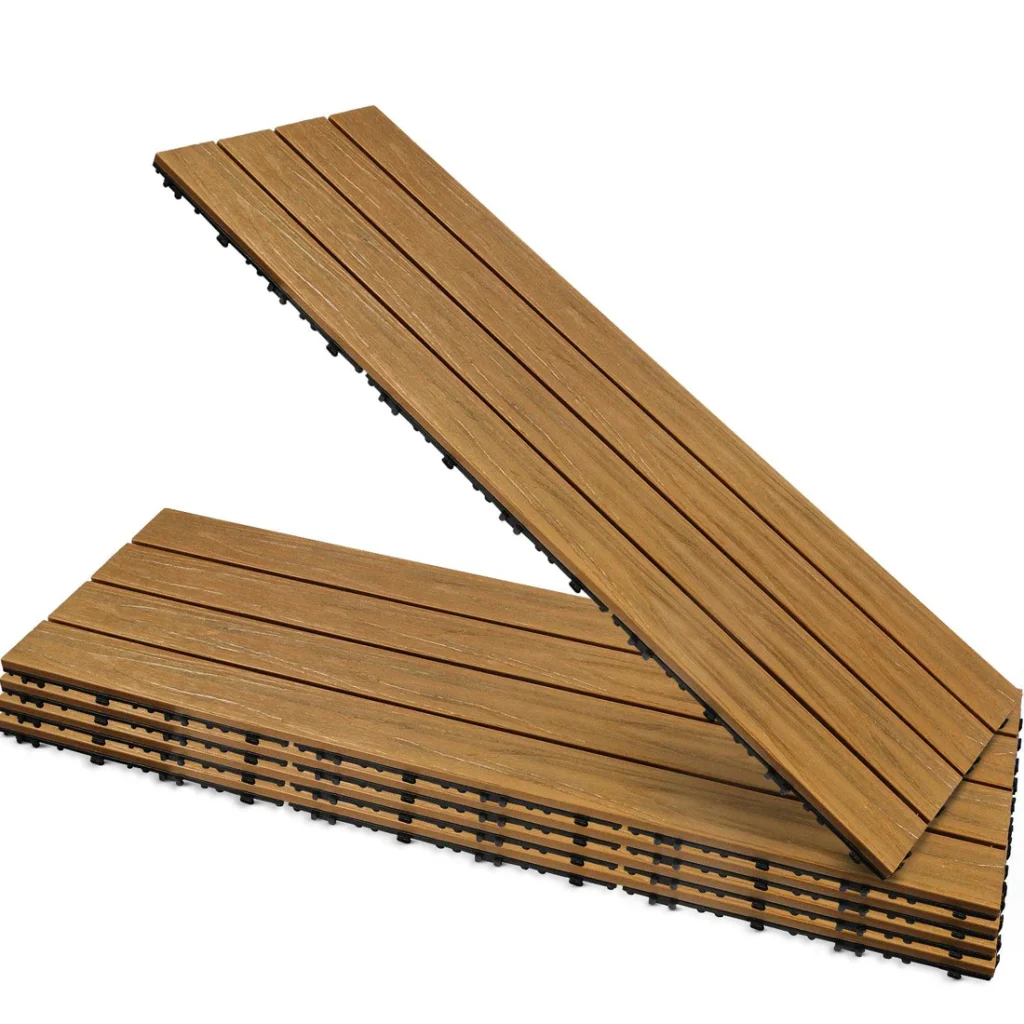
Conclusion: Why Outdoor Interlocking Tiles UK Are Worth It
If you’re looking for a durable, beautiful, and low-maintenance solution for your outdoor spaces, outdoor interlocking tiles UK options are truly unbeatable. Their easy installation, variety of designs, weather resistance, and cost-effectiveness make them ideal for modern British homes and businesses.
Whether you’re giving your balcony a facelift, building a safe play area for kids, or upgrading your patio, interlocking outdoor tiles deliver both form and function.
Need Help Choosing the Right Tiles?
If you’re not sure where to start or which tile is best for your application, don’t hesitate to contact local suppliers or visit showrooms. Many UK tile providers offer free samples, layout planning assistance, and professional installation services if needed.
Transform your outdoor space today with outdoor interlocking tiles UK that combine practicality, style, and lasting value.
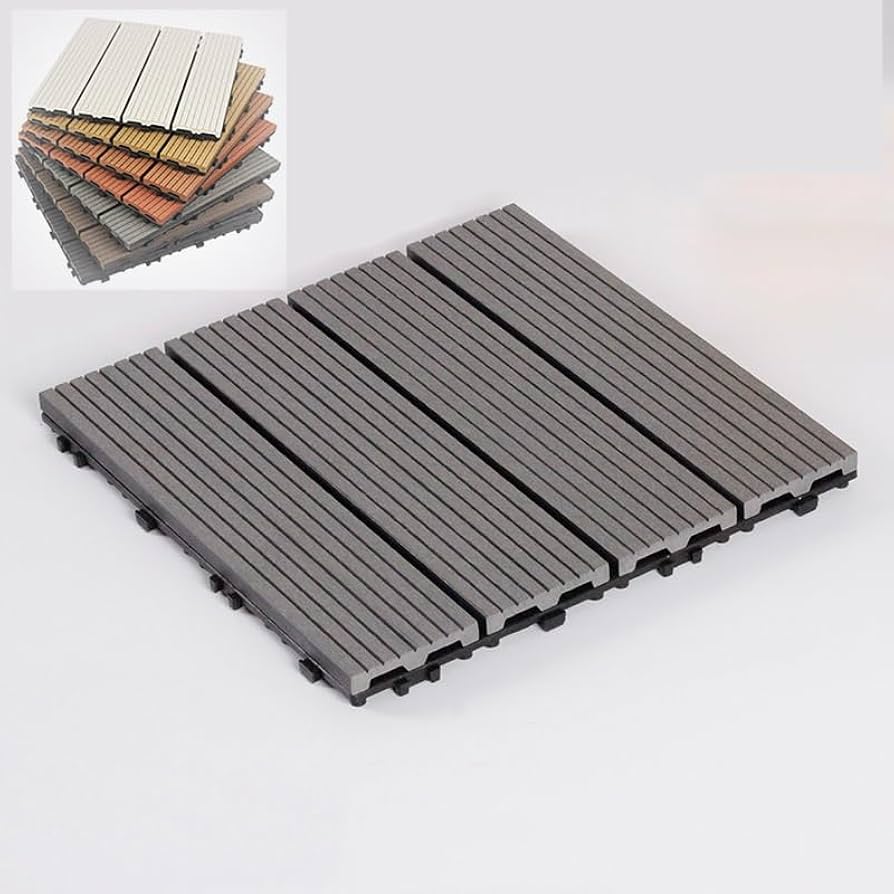
FAQs About Outdoor Interlocking Tiles UK
Q1: Can I install these tiles on grass or gravel?
Some tiles can be used on grass, especially with a stabilizing base layer. However, a flat and firm surface is ideal for best performance.
Q2: Do they get slippery when wet?
Most outdoor tiles are designed to be slip-resistant. Check the product rating for wet traction.
Q3: Can I leave them out year-round?
Yes, most high-quality tiles are UV- and frost-resistant, making them suitable for year-round use in the UK.
Q4: Are these tiles pet-friendly?
Yes! Rubber and WPC tiles are particularly pet-friendly due to their non-toxic, anti-slip surfaces.
Q5: How long do outdoor interlocking tiles last?
With proper care, quality outdoor interlocking tiles UK residents purchase can last 10 years or more. Lifespan depends on the material—WPC and porcelain tiles typically last longer than basic plastic options.
Q6: Do I need professional installation?
Not necessarily. One of the main advantages of interlocking tiles is their DIY-friendly design. However, for large or uneven areas, a professional installer can ensure the surface is perfectly level and the pattern is aligned.
Q7: Can they be reused if I move?
Yes. Since they’re not permanently fixed, you can simply unlock the tiles, pack them, and reinstall them in your new location. This makes them an economical choice for renters in the UK.
Q8: Are there colour and style variations?
Absolutely. From classic wood tones to modern grey stone effects, there are dozens of colours, textures, and finishes to match any outdoor design theme. Many UK suppliers also offer sample packs so you can test before buying.

